- Home
- John Bellairs
The Bell, the Book, and the Spellbinder Page 10
The Bell, the Book, and the Spellbinder Read online
Page 10
Johnny looked out the car window. Mesopotamia was a little cluster of wood frame and brick buildings. He saw a hardware store, a drugstore, a general store, and a grocery, but as the professor had observed, they were all closed and silent. "I know one thing that will be open," said Johnny. "The train station."
"My thought exactly," answered the professor. He drove a little farther until he spotted the station, and then he parked the Oldsmobile in a gravel lot. They all climbed out, stretching their cramped arms and legs, and crunched over the gravel to the station, a modest clapboard affair painted a dull yellow. The moonlight gleamed in long, silver lines on the railroad tracks just the other side of the station.
They pushed through a door and found themselves in a small waiting room. Four benches, like church pews, stood around empty. A tall green candy machine and a red soft-drink machine stood against the far wall next to the big doors that opened onto the platform, and doors to the men's and women's rooms were on the left. To the right was a counter that opened through into another room. Behind the counter, a short, potbellied, balding man of about fifty was asleep in a wooden chair. He had the chair tilted back against a filing cabinet, and his feet were propped on a small black cast-iron stove. The man wore a green celluloid eyeshade that cast a green shadow over his long nose, scraggly black mustache, and weak chin.
"Service!" roared the professor, clapping his hand down flat on the counter.
The man jumped at the sound, scrambled up from his chair, and hurried to the counter. "Sorry, sorry," he said, rubbing his palm over his face. "Didn't see you come in. Yes, yes, what'll it be for you fellas?"
"Just a little information," said Father Higgins, pushing in front of Professor Childermass. "Early yesterday morning, a long-haired old man got off the train here. He had a great big trunk with him. Did you notice him?"
"Hum," said the stationmaster. "That woulda been old Mr. Omen. Yep, I recall he got off the mornin' train, all right. He hauled that trunk out to his car himself—wouldn't let me touch it."
"Where does the villain live?" asked the professor in a voice like the first rumble of an earthquake.
The stationmaster backed away. "Say, who are you men, anyways? And who's that boy?" He narrowed his brown eyes. "Seems t' me we had a bulletin t' look out for a runaway kid."
Professor Childermass swelled like a frog. "You are wasting our time, your time, and perhaps the life of the very boy you read about! Sir, if I have to, I will come behind that counter and persuade you myself, but before we leave here, you will tell us where this so-called 'Omen' lives!"
The little man looked alarmed. His eyes grew round, and he tugged nervously at his shaggy black mustache. "Now, now, don't get all in a lather. Why, that old fellow's a character in these parts. Yessir, a real character. His name's Armyn J. Omen, an' he lives in the old huntin' and fishin' lodge, out toward Lake Mooselookmeguntic. You go north on th' gravel road, up the side o' Camelback Mountain and across Black Bear Notch. Then you follow the road, oh, I dunno, about three, four miles, an' you'll see a dirt road on your left that turns off to the west. Well, y' take that until you cross th' old bridge—you'll know it when you come t' it—an' then look sharp for a lane that cuts off to th' right. It goes straight to th' old Mooselookmeguntic Lodge."
"Thank you," said Father Higgins, and he hustled the professor out to the Oldsmobile before anything more could be said. "I'll drive," the priest announced. "Roderick, you should watch your temper. It's a wonder that fellow told us anything, the way you blew up at him. You can catch more flies with honey than with vinegar, you know."
"Phooey!" erupted the professor, yanking open the passenger's door. "Who wants a handful of sweet, sticky flies?"
Sighing, Father Higgins started the car. "I suppose," he said, "you noticed the clever alias."
"Yes, yes, of course," grumbled the professor. "Armyn J. Omen is an anagram of Jarmyn Nemo. Even though he doesn't possess much imagination, our precious Dr. Thanatos has more names than Heinz has pickles!"
"Now, there is a welcome sight," said Father Higgins. They had passed through most of the town, but ahead on the left was a little motel, a flat-roofed, U-shaped building with only about a dozen units. Its blue-and-red neon sign said it was the Mesopotamia Inn and that it had vacancies. Father Higgins drove into the motel parking lot.
"What in the world are you doing?" asked the professor.
"Roderick," the priest said patiently, "it is the middle of the night. Even if we can find this place, we can't see much, and if we use lights, we'll give ourselves away. I think our best plan is to snag a little sleep, start out again at daybreak, and get there in the early morning. At least then we'll have some faint hope of catching Thanatos by surprise. I very much doubt that he's hurt Fergie—yet. He had no idea that Sarah would be so quick to track down his movements. From what you found out, he must think anyone looking for him would head for his old stamping grounds in Vermont, not to his hideout in Maine. As far as Thanatos knows, he got away from Duston Heights scot-free, and no one there has an inkling of who he really is."
After some grumping, the professor gave in. They rented a room with two regular beds and a Murphy bed, which is the kind of bed that folds up into a compartment in the wall. Although both men were world-champion snorers, Johnny was so sleepy that he conked out at once. Not even the fear of what they might find at the end of their journey could keep him awake—but he tossed now and then with bad dreams about the malicious Dr. Thanatos.
One dream in particular was odd. He thought he was playing Pickup Sticks with a sad-faced boy a little younger than he was. The game never really got started, though, because the other boy kept bunching up the sticks and tossing them onto the ground. "It's hard to make sense in the dark," the boy complained.
Johnny had no idea what he was talking about. But he noticed that every time the sticks clattered to the floor, they formed patterns. Something about the patterns almost had meaning. But the boy always picked the sticks up and threw them down before Johnny could make heads or tails of them. "Who are you?" Johnny asked.
"I'm nobody," answered the boy. "I was someone, but he made me nobody." He threw the sticks down again, and they clattered very loudly.
Johnny looked at them. They had become miniature bones, ribs and femurs and humeri. And they fell together to spell out the word NEMO. The boy reached to pick them up again.
With a gasp, Johnny saw that the bones had become thin sticks again—but the boy's hand was a skeleton's hand. He looked up, into the empty eye sockets of the aged skeleton he had seen in the coffin. The skeleton's jaw opened and closed, and the boy's voice came from the fleshless mouth: "He locked me in the dark. I tried to dig my way out, but I was too weak, too weak! Remember the four elements!" And then the skeleton flung the sticks one last time.
They landed in the pattern of the letters that had been scratched on the inside of the coffin lid. Everything grew dark, but the letters glowed with a faint light of their own. Johnny reached to pick up the sticks and his hand hit something smooth and hard, something made of metal. He flattened his hand against it and realized that the sticks had become scratches. And somehow now they were above him—
He was locked inside a coffin.
With all of his strength, Johnny pushed at the lid, but it was shut fast. He couldn't budge it. His chest heaved. The air was running out. And now the letters were writhing, coming to life, becoming those horrible dry husks of insects. They crept about just above him, and then dropped onto his face—
He screamed and sat up. The professor and Father Higgins were already up and dressed, and they stared at him. Milky morning light came through the motel room window. It was daybreak, and they were ready to attack Dr. Thanatos in his stronghold.
CHAPTER FOURTEEN
"May all the saints have mercy on us," said Father Higgins softly. The gravel road had become narrower and narrower as it twisted up the flank of Camelback Mountain. It crested at Black Bear Notch, and then started down aga
in—but Black Bear Notch was barely wide enough for the Oldsmobile to creep over. Johnny cringed. To his left, the mountainside fell away in a sheer five-hundred-foot drop. The cliff side was weathered gray granite, streaked with black patches of darker stone and blotchy with the pale green rings of lichens. From a cleft in the stones far below, a waterfall leaped out to tumble down in a series of cascades, ending in a snaky black stream that wound through a dense forest. A few rocks crumbled away as Father Higgins eased the car through the pass.
Then they all took a deep breath. The road twisted down again, and they gathered speed. "Three miles," announced Professor Childermass, who was watching the odometer with the eye of a hawk. "Watch for that dirt road, Thomas."
"I'm watching, Roderick," said Father Higgins. But the stationmaster's directions were a little off. The Oldsmobile rolled through a desolate countryside, where ruined foundations and isolated, broken chimneys marked old, deserted farms. Even a stretch of rhyming Burma Shave signs alongside the road looked weathered and abandoned. No car met or passed the Oldsmobile, and Johnny saw no trace of any living being. They drove almost another three miles before the dirt road cut away to the left. Father Higgins made the turn, and the car bounced and creaked along a rutted country lane, weeds brushing both sides. The lane still went downhill. They crawled at about twenty miles per hour for a good distance, and at last the road began to level. "There's the bridge up ahead," Father Higgins said. "Do you think it's safe, Roderick?"
"I think we'd better inspect it," replied the professor.
The span looked ancient. It was a rickety, swaybacked wooden structure built on four piers of rounded brown river stones and was only about thirty feet long. The water underneath was very dark, almost black in the early light. Professor Childermass walked onto the bridge, stamped his feet, took a deep breath, and said, "It may hold us, or it may not. I suggest that you and John cross on foot, and I'll drive the car over."
"Get out, Johnny," said Father Higgins. "You go on. I'll drive the car myself. If it plunges into the drink, at least I'll be the one responsible for it, and not Rod." Johnny climbed out and joined the professor, who groused a little, but they both crossed over the bridge. The Oldsmobile moved forward foot by foot. The bridge was so narrow that the big car almost scraped the rails on either side. The old boards creaked and crackled and sagged, but they held up, and after what seemed like an agonizing time, the car was across.
"Now," said the professor as he and Johnny climbed back in, "I spy with my little eye something that looks like an old signboard up ahead. Let's see what it says." They drove slowly forward. The signpost leaned drunkenly from a thick tangle of blackberry vines, sun-faded to a dismal gray with just a few traces of white letters still visible:
MO ELOOK C LODG
A ghostly arrow pointed down a badly overgrown lane on the right.
"This is it," said the professor. "I can see where the weeds were crushed down recently. That must have been when our friend with the trunk drove this way. I suggest that we get the car off the road, then proceed on foot. It isn't even seven-thirty yet, and we may take the fiend by surprise."
They walked single file down the overgrown lane. Weeds, wet with dew, slapped against them. Cobwebs, invisible until they stuck to their faces, lay across their path. They turned a curve, and ahead of them they saw a big log cabin. It was two stories tall, with a row of six gables across the front, and it had a couple of stone chimneys. The roof had been covered with gray cedar shingles, but dozens of these had blown off, leaving irregular bare spots. Patches of green moss spattered the roof and the dark brown walls. A sagging porch ran across the front and above it was a sign, which read Mooselookmeguntic Lodge. A tall wooden tower stood near the cabin, and about a hundred yards behind, a dark, misty lake lapped at a derelict old pier that had half fallen into the water.
Father Higgins was leading the way. He crouched low, and Professor Childermass and Johnny stooped behind him. "Well, Roderick?" asked the priest. "You're the military expert. How do we attack?"
"I was in intelligence, not the infantry," returned the professor. "However, I think our best approach would be to follow the hillside on the left. The trees there will give us cover. We'll come out on the chimney side of the house, which looks like a blind spot. Let's go. Space yourselves out so that Father Higgins is about twenty feet ahead of you, John. I'll bring up the rear."
They carefully and quietly snuck through a ruined apple orchard, the trees all wild and long unpinned. Small green apples, most of them already worm-eaten, clung to the gnarled branches. Then they emerged very close to the house. "Ah-ha," whispered the professor. He pointed, and Johnny saw the long black hood of an old car projecting from behind the house.
"A Duesenberg," said Father Higgins. "A real antique—it must be thirty years old."
"But it has a big, powerful engine. Just right for hauling mysterious trunks. I'm going to take a look." The professor darted forward in a series of short runs. He reached the corner of the lodge, peered around, and stiffened. "Oh, my God!" he exclaimed. "Come quick!"
The other two ran to join him. Johnny saw what had startled the professor, and he felt his heart sink. A low mound of dirt, six feet long and three feet wide, was just behind the lodge. A pick and shovel were stuck into the freshly turned earth. The same thought flashed through all three minds at once. Without a word, the professor and Father Higgins seized the tools and began to dig with frenzied haste. The clammy, wormy scent of moist soil filled Johnny's nose. Chunk! Thud! The pick and shovel bit deeper and deeper into the earth. Then the spade shrieked against something metal. It was not very deep, only a couple of feet down. The professor used the shovel to clear all the dirt off the top of a metal coffin. "Help me!" he shouted. Father Higgins stooped and put the point of the pick under the edge of the coffin lid. Then he pulled back with all his strength, using the pick like a lever. The lid sprang open.
Johnny screamed. His friend Fergie lay inside the coffin, his arms folded, a black book clutched to his chest. His eyes were closed, his face was pale, and his hair had turned completely white.
CHAPTER FIFTEEN
"He's breathing!" yelled the professor. He and Father Higgins lifted Fergie out of the coffin. They lay him on the grass. Fergie was wearing his motorcycle jacket, jeans, and boots. Except for his hair, he didn't look any different.
"The spell isn't complete," said Father Higgins. He patted Fergie's face. "Byron! Wake up!" No response. More loudly, the priest said, "Byron Ferguson! This is your baseball coach. We've got two men out in the ninth, and we're one run behind. Go to bat now!"
Fergie stirred slightly, but his eyes did not open. Something moved at the edge of Johnny's vision. He turned around, startled, and yelled in surprise, "Look! That must be him!"
A dark figure was climbing the ladder of the wooden tower. It was a small, slight man, dressed in black. His long hair was iron-gray and curled down over his shoulders. He glared down at them as he climbed, his mouth set in a grimace of hatred. Professor Childermass stood up straight, brandishing the spade. "You!" he shouted. "Doctor Jarmyn Thanatos! Stop where you are!"
"Fools!" yelled the climbing figure. "You're too late to stop me! No one can stop me now! The process has begun! Begone, I say, or else you will wish you had never been born!" He reached a platform at the top of the tower and stretched up an arm.
"You're the one who'll be sorry!" returned the professor. "Give yourself up. If I have to burn down that tower to get you, I'll do it—Jarmyn Cudbright!"
The climbing man reeled, as if he had almost fallen. He threw back his head and howled, a long animal sound. Then his stretched-out hand found what he was searching for, and he tugged a rope. A bell clanged.
Johnny put his hands tight over his ears, but the sound made the ground shake as though an earthquake were rolling through. Professor Childermass staggered and fell, and Father Higgins collapsed to his knees. "I am the master of bells!" sang Thanatos in a triumphant voice. "I can make the clamo
r still you or kill you! And know, old fool, that fire is not the element that can stop me. Have a taste of darkness and death, you interfering insects!" He yanked the rope again, and the bell sounded. Johnny screamed, but he could not even hear his own voice over the terrible noise. The world turned dark. He was blacking out.
And when all was dark, a strange thing happened. He saw those glowing lines again, the letters the doomed Tommy McCorkle had scratched into the lid of the death-trap coffin. But this time they fell together and made sense. This time Johnny knew what he had to do.
USEW ATHR TODE STRY BK. A nonsense jumble of letters. But allowing for the darkness, allowing for the trapped Tommy McCorkle's terror, the letters would make sense if you looked at them a little differently. He must have been running out of air. He put some strokes in the wrong places because he couldn't see, and he abbreviated the last few words. The answer was in one of the ancient four elements. Not air. Not earth. Not fire. But—
USE WATER TO DESTROY BOOK.
Water! And only a hundred yards away was a whole lake of it!
The darkness parted like clouds rolling away. Professor Childermass lay on the grass, unconscious. A dazed Father Higgins was pushing himself up from the ground. It was up to Johnny.
He grabbed the book and tore it from Fergie's grasp. He clutched it like a football and ran for his life. Behind him he heard Thanatos screech in fury: "Get him! Stop him! I command you!"
Johnny had never been any good at football. He was winded even before he was halfway to the dock. Then he heard footsteps pounding close behind. Thanatos? He couldn't look around. He put on a new burst of speed. He ran out to the edge of the sagging dock—
Whump! Someone tackled him, sending him sprawling. His glasses flew off, and he lost his hold on the book. It skidded across a patch of sand and came to rest on the first plank of the half-ruined pier. Johnny rolled and squirmed, and he saw that the person who had grabbed him was—

 The Curse of the Blue Figurine
The Curse of the Blue Figurine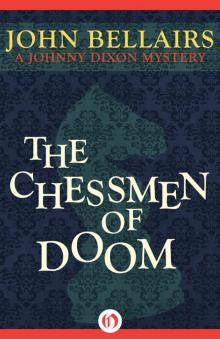 Chessmen of Doom
Chessmen of Doom Secret of the Underground Room
Secret of the Underground Room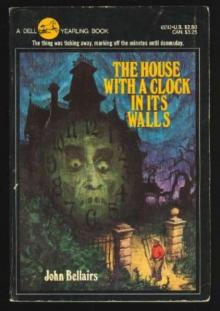 The House With a Clock in Its Walls
The House With a Clock in Its Walls The Vengeance of the Witch-Finder
The Vengeance of the Witch-Finder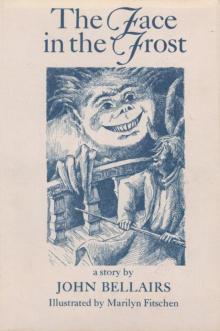 The Face in the Frost
The Face in the Frost Revenge of the Wizard's Ghost
Revenge of the Wizard's Ghost Spell of the Sorcerer's Skull
Spell of the Sorcerer's Skull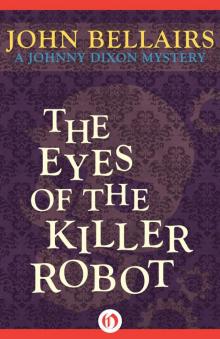 Eyes of the Killer Robot
Eyes of the Killer Robot Mummy, the Will, and the Crypt
Mummy, the Will, and the Crypt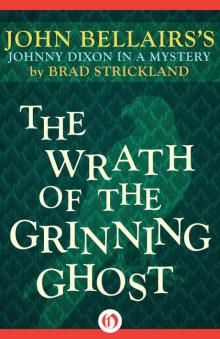 Wrath of the Grinning Ghost
Wrath of the Grinning Ghost The Mansion in the Mist
The Mansion in the Mist The Doom of the Haunted Opera
The Doom of the Haunted Opera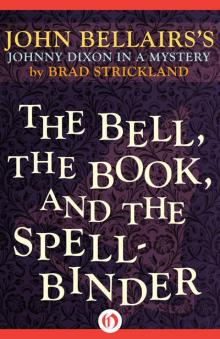 The Bell, the Book, and the Spellbinder
The Bell, the Book, and the Spellbinder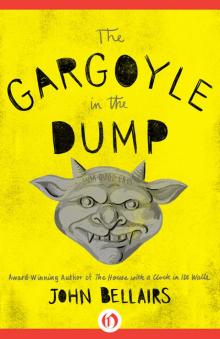 The Gargoyle in the Dump
The Gargoyle in the Dump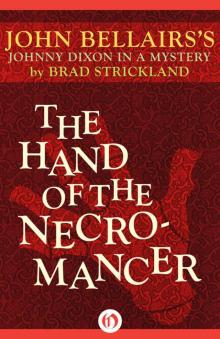 The Hand of the Necromancer
The Hand of the Necromancer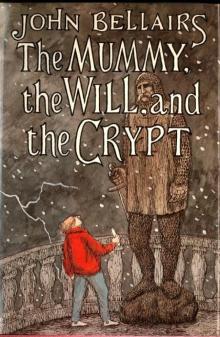 The Mummy, the Will, and the Crypt
The Mummy, the Will, and the Crypt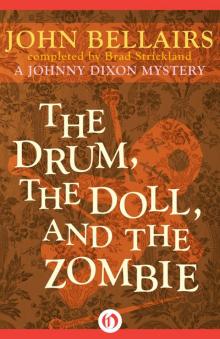 Drum, the Doll, and the Zombie
Drum, the Doll, and the Zombie The Specter from the Magician's Museum
The Specter from the Magician's Museum The Letter, the Witch, and the Ring
The Letter, the Witch, and the Ring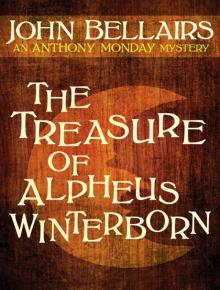 The Treasure of Alpheus Winterborn
The Treasure of Alpheus Winterborn The Dark Secret of Weatherend
The Dark Secret of Weatherend The Figure in the Shadows
The Figure in the Shadows